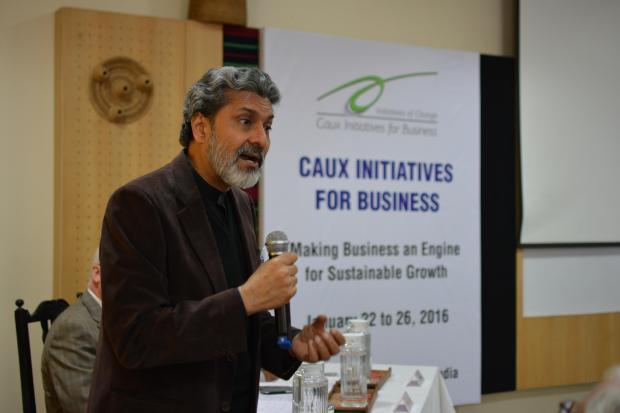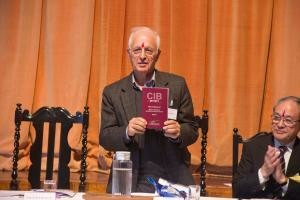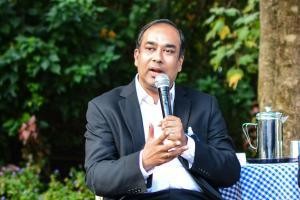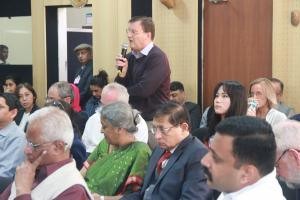CSR seen as much more than philanthropy at global business values conference
Author: Mike Smith

CSR (Corporate Social Responsibility) is much more than donating two per cent of profits to social causes (mandated under Indian corporate law), concluded Sarosh Ghandy, at the end of the sixth biennial CIB conference (Caux Initiatives for Business), held in India from 22 to 26 January. The venue was Asia Plateau, the Asian centre of Initiatives of Change in Panchgani, Maharashtra. Ghandy, a former Tata director who is the moving spirit behind the CIB conferences, said that CSR should be seen as repaying back to society what business has taken from society. ‘CSR is not philanthropy but what business has as its due to society. It is not a PR gimmick,’ he said.
It was an appropriate note to strike at the end of the five-day conference on the theme of ‘Making business an engine for sustainable growth’. It brought together CEOs, Managing Directors and senior executives from across India as well as from Japan, Kenya and elsewhere.
Among the keynote speakers were Rajiv Dubey (above), member of the Group Executive Board of Mahindra and Mahindra, the world’s largest tractor manufacturer, and R Gopalakrishnan, former Director of Tata Sons. While Gopalakrishan emphasized the need for empathy and the wisdom of the ‘inner voice’ in business decision-making, Dubey spoke about Mahindra’s CSR commitment to such issues as girl education and tree planting under its Mahindra Rise programme. The multinational is aiming to be carbon neutral, he said.
 The conference had opened with an appeal to zamir, or conscience, in business decision-making, from Arun Maira (left), the former Managing Director of Tata Motors in Pune, and from Hironori Yano, the Chairman of the Caux Round Table group in Japan, who quoted from Confucius. ‘What you need is a good conscience and to listen to it,’ said Maira, outlining rungs of the ‘accountability’ ladder of responsible business. The same note of conscience was struck by Michael Smith, author of Great Company, when he presented the Indian edition of his new book to the conference. He quoted from the moral philosophy of Adam Smith, the founding father modern economic thought. Smith had earlier spoken to 500 MBA students at the Sri Balaji Society Institute of Management in Pune.
The conference had opened with an appeal to zamir, or conscience, in business decision-making, from Arun Maira (left), the former Managing Director of Tata Motors in Pune, and from Hironori Yano, the Chairman of the Caux Round Table group in Japan, who quoted from Confucius. ‘What you need is a good conscience and to listen to it,’ said Maira, outlining rungs of the ‘accountability’ ladder of responsible business. The same note of conscience was struck by Michael Smith, author of Great Company, when he presented the Indian edition of his new book to the conference. He quoted from the moral philosophy of Adam Smith, the founding father modern economic thought. Smith had earlier spoken to 500 MBA students at the Sri Balaji Society Institute of Management in Pune.
The emphasis on conscience-based decision-making was also emphasized each morning by an opening session on ‘inner governance’, encouraging participants towards personal reflection, inspiration from the ‘inner voice’ and the notion that ‘change starts with me’.
Most striking throughout the conference were, firstly, the stories of a vigorous stance against corrupt practices told by business leader after business leader. They may be in a minority as a whole across India. But their conviction was backed up by solid evidence. Companies such as Tata’s, Siemens and Thermax have a commitment to integrity in all their operations. M S Unnikrishan, MD and CEO of Thermax heating boilers company in Pune, also emphasized the need for a ‘human development index’. The creation of wealth is ‘for the improvement of the quality of life of all human beings’, not just the shareholders, he said. He saw the time coming when technology would be able to separate hydrogen from water to provide the world’s primary energy resource. Prasad Chandran, former MD of BASF in India, said in the closing session that he was devoting the next 10 years of his life to the ‘million miles of fighting corruption’, as he put it.
Secondly, CIB city chapters have been launched across India, a country the size of a continent. They are already in Pune, Mumbai, Bangalore, and Jamshedpur, with the possibility of further chapters in three other cities. The CIB chapters typically meet each month and then organize bigger round-table events, held up to four times a year. The round-tables give business leaders, from corporations such as Tata’s, Mahindra and Mahindra, Siemens, Thermax, SKF, and other leading businesses, the chance to meet together and share best ethical practice.
 When we were not meeting indoors at plenary sessions, we met under the trees to cross-question, firstly, Sunil Mathur (right), the Managing Director of Siemens in India and South Asia, and then Shishir Joshipura, the MD in India of the Swedish ball-bearings company SKF. The issues are large. Is the huge capital expenditure on a new bullet train between Mumbai and Ahmedabad justified, for instance, when the investment, one of the largest ever undertaken in India, could be spent on hospitals, schools and other social infrastructure? For Mathur, it was a matter of India’s global standing as well as the obvious spin-off of thousands of jobs and small businesses that will be generated by the investment. And, in effect, what is good enough for Japan, China, France and the European Union is good enough for India.
When we were not meeting indoors at plenary sessions, we met under the trees to cross-question, firstly, Sunil Mathur (right), the Managing Director of Siemens in India and South Asia, and then Shishir Joshipura, the MD in India of the Swedish ball-bearings company SKF. The issues are large. Is the huge capital expenditure on a new bullet train between Mumbai and Ahmedabad justified, for instance, when the investment, one of the largest ever undertaken in India, could be spent on hospitals, schools and other social infrastructure? For Mathur, it was a matter of India’s global standing as well as the obvious spin-off of thousands of jobs and small businesses that will be generated by the investment. And, in effect, what is good enough for Japan, China, France and the European Union is good enough for India.
Conference participants were made more than ever aware that the global economic shift in the next decades is towards the world’s two most populous countries: China and India. The challenge for CIB will be to engage much more with Chinese participants in future years.
CIB is also expanding across the Arabian Sea to East Africa. From Nairobi, Kenya, Johnson Mwakazi, editorial director of WTV, told in his sonorous, Shakespearean voice how he had risen from the poorest slum in Kenya where his mother had earned $30 a month. Formerly an actor he now hosts a TV programme that celebrates good news of best practice emerging from Kenya’s 7.5 million small and medium sized enterprises.
 From Japan Chikako Miyata, a former cabin attendant and now Director of CSR Promotion at All Nippon Airways (ANA), told how Japan’s first five-star airline is reducing its environmental impact and CO2 emissions.
From Japan Chikako Miyata, a former cabin attendant and now Director of CSR Promotion at All Nippon Airways (ANA), told how Japan’s first five-star airline is reducing its environmental impact and CO2 emissions.
At the concluding session Barbara Hintermann, the Secretary General of the Caux Foundation, running IofC’s global centre in Switzerland, said: ‘What I have experienced in Panchgani has given me much hope. I am very proud to be a part of IofC and to contribute to a better world.’ She hoped that there would be a continuing partnership between CIB and Europe. IofC’s European business programme known as TIGE (Trust and Integrity in the Global Economy), will hold its 10th anniversary conference in Caux from 5 to 10 July, and several from India expressed an interest in participating. TIGE will seek how to develop its relationship with CIB in the coming years. Sarosh Ghandy announced that the next CIB conference in Panchgani will be held in February 2018.